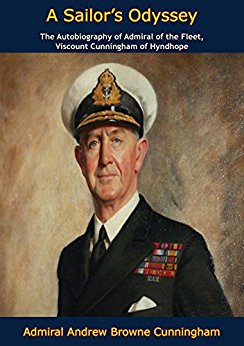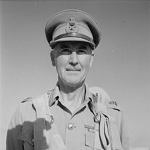Background
Cunningham was born in Rathmines in the south side of Dublin on 7 January 1883


(First published in 1951, this is the autobiography of a d...)
First published in 1951, this is the autobiography of a distinguished commander of WWII. Serving in both wars, he was Commander-in-Chief Mediterranean at the outbreak of war, forced to cope with inadequate resources and virtually no air cover. After a short spell in Washington as a Naval Representative he returned as Commander-in-Chief Mediterranean and worked with Eisenhower and Alexander. His unique insight into the meetings with Churchill, Stalin and Roosevelt make this a riveting read. “My main reasons for yielding to the suggestion [of setting down this record of my life] were because I wished to do justice to those under whom I served and from whom I learnt so much in my earlier years at sea, and also to pay a deserved tribute to those many whom I later had the honour and privilege to command in the Mediterranean and elsewhere. Further, before memory became dimmed by the passage of time, I was anxious to describe what I saw of the part played by the Royal Navy in the two great wars of the present century which lasted in all for more than ten years. “In describing the years of war I have kept as closely as possible to those matters with which, and in which, the Navy was primarily concerned and engaged. Moreover, as nearly as may be, I have tried to concentrate upon that portion of the Navy with which I happened to be serving. […] success in war cannot be attributed to any single Service. Each one is helpless without the closest and most loyal co-operation with the other two. This applies equally to our two great Sea Services. In war the Royal and the Merchant Navies have always been interdependent and indivisible.”
http://www.amazon.com/gp/product/B06Y42ZZPB/?tag=2022091-20
1951
Cunningham was born in Rathmines in the south side of Dublin on 7 January 1883
After starting his schooling in Dublin and Edinburgh, Cunningham enrolled at Stubbington House School, at the age of ten, beginning his association with the Royal Navy. After passing out of Britannia Royal Naval College, Dartmouth, in 1898, he progressed rapidly in rank.
Cunningham served as a midshipman in the South African War and as commander of a destroyer in the Mediterranean in World War I. In 1937 he was made a vice admiral and assigned as second in command in the Mediterranean. Because of his convoy work and fighting in the defense of Malta in World War II, he was promoted to admiral in 1940. In 1943, as commander in chief of the Allied forces in the Mediterranean, Cunningham received the unconditional surrender of the Italian fleet at Valetta, Malta, and was then recalled to London and made Admiral of the Fleet and First Sea Lord. He organized the British fleet for the war against Japan, and on Sept. 27, 1945, was knighted by King George VI. In 1946 he was raised to the peerage as Viscount Cunningham of Hyndhope, and in 1956 he was made a Knight of the Grand Cross in the Order of the Bath.
Cunningham commanded a destroyer during the First World War and through most of the interwar period. He was awarded the Distinguished Service Order and two Bars, for his performance during this time, specifically for his actions in the Dardanelles and in the Baltics.
(First published in 1951, this is the autobiography of a d...)
1951
